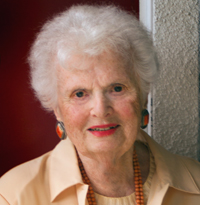By Natasha Josefowitz, ACSW, Ph.D.

LA JOLLA, California — I was raised in a traditional Russian family. My father always said, “We dont’ talk business in front of the ladies” as it was considered very rude. My first husband, raised with a similar background, was equally reserved; his perception was that it was “too complicated for a woman to understand.” My second husband, a professor of economics, naturally took over all financial and business decisions. I must admit I was relieved that I didn’t have to deal with such time-consuming and boring matters as taxes.
Although I had been in charge of handling household bills, all insurances, taxes, real estate, and Medicare concerns fell under my husband’s domain. This was the normal arrangement with all the couples I knew. When my husband died, widowhood followed with many new responsibilities, including financial matters. I felt overwhelmed and inadequate. I berated myself for not taking advantage of the opportunities over the years to learn to take care of myself and for allowing myself to rely on others for fiscal matters. Sadly, I know I am not the only one to have had this experience; my generation of widows do not understand family retirement plans and investments.
According to the 2019 U.S. Census Bureaus, women are three times as likely to lose a spouse than men, and fifty percent of them lose half their income when they become widows. Thirty-seven percent of widows are not familiar with the basic of spousal survival benefits. Twenty-six percent have trouble locating their bank account information. Only fourteen percent of married women make financial decisions.
The U.S. Department of Education reports 3.8 million American women possess literacy skills below basic level. This makes it difficult to understand bank statements, credit card agreements, and other financial documents. Women make up forty-seven percent of the workforce and earn twenty percent less than men. This earning gap limits available Social Security benefits.
As a result of these challenges, women are more likely to encounter poverty in old age. Given that women are less financially literate than men, they lack confidence in their ability to plan for their future and are less likely to invest in the stock market. This also shows itself in women’s lack of negotiating skills, like asking for a promotion or a salary increase. Many women say that the stock market volatility makes them anxious.
Demographics add to the fact that with longer life spans, women spend an increased time in widowhood. A P-FIN Index survey multiple choice on financial literacy included the option, “I don’t know.” Women responded twenty-five percent of the time in this way.
Why is this happening? Why don’t couples talk about money? First there is a lack of interest for women to discuss financial plans; then it is a matter of habit.
Exacerbating the problem of trying to understand and cope with financial matters “widow’s brain” or “brain fog” is a term used to describe the fogginess and disconnection one feels after the death of a spouse. It could be the brain’s way of coping, shielding itself from the trauma. The following symptoms are commonly described: forgetfulness, irritability, exhaustion, numbness, and overwhelming sadness; these can last from a few months to over a year. It is important to not only seek help from family and friends, but accept and take advantage of when offered. One must allow grief to run its course; the healing process cannot be rushed.
When ready, the most important thing a widow must do is find a trusted professional advisor; it can be a CPA, an attorney, or other qualified professional in the area of investments and estate planning. A good starting point is to review a list of assets and incomes. Learn your credit scores, keep a record of your personal debt, make a budget, open a savings account, pay any 0verdue bills, and plan for your retirement. Again, a financial advisor can help unless you have experienced friends or family. This is all doable with time and patience.
While the above is true for our current generation of widows, the tide will turn with the number of women graduating with MBA’s and engineering degrees. This new generation will be on an equal footing with their husbands in making financial decisions when they become widows. In the meantime, I cannot emphasis enough the importance for married women to become knowledgeable about finances while their husbands are still alive.
*
© Natasha Josefowitz. This article appeared initially in the La Jolla Village News. You may comment to natasha.josefowitz@sdjewishworld.com